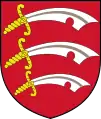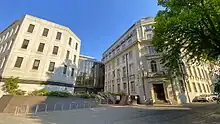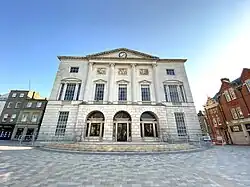Essex County Council
Essex County Council is the county council that governs the non-metropolitan county of Essex in England. It has 75 councillors, elected from 70 divisions, and has been under Conservative majority control since 2001.[2] The council meets at County Hall in the centre of Chelmsford. It is a member of the East of England Local Government Association.
Essex County Council | |
|---|---|
 Arms of Essex | |
 Council logo | |
| Type | |
| Type | |
| Leadership | |
Gavin Jones since January 2016 | |
| Structure | |
| Seats | 75 (38 needed for a majority) |
 | |
Political groups |
|
Length of term | 4 years |
| Elections | |
| First-past-the-post | |
Last election | 6 May 2021 |
Next election | 2025 |
| Meeting place | |
 | |
| County Hall, Market Road, Chelmsford, CM1 1QH | |
| Website | |
| www | |
History
Elected county councils were created under the Local Government Act 1888, taking over many administrative functions that had previously been performed by magistrates at the Quarter Sessions. The first elections were held in January 1889, and the council formally came into being on 1 April 1889. The council held its first official meeting on 2 April 1889 at the Shire Hall in Chelmsford. The first chairman of the council was Andrew Johnston of Woodford, a Liberal, who held the post for 27 years until he stood down in 1916.[3][4]
The area governed by the county council (called the "administrative county" until 1974) excluded county boroughs, which were towns considered large enough to provide their own county-level services. When the county council was established in 1889 there was one county borough within the wider county of Essex, at West Ham.[5] Other county boroughs were subsequently created, removing them from the administrative county, being Southend-on-Sea in 1914 and East Ham in 1915.[6][7] The administrative county was further reduced in 1965 under the London Government Act 1963 which transferred Barking, Chingford, Dagenham, Hornchurch, Ilford, Leyton, Romford, Walthamstow, and Wanstead and Woodford to Greater London.[8]
The county was reconstituted in 1974 as a non-metropolitan county under the Local Government Act 1972, which reformed the council's powers and responsibilities and saw it regain jurisdiction over Southend-on-Sea. The county was divided into 14 non-metropolitan districts at the same time, forming a lower tier of local government.[9] In 1998 two of the districts, Southend-on-Sea and Thurrock were made unitary authorities, removing them from the area controlled by Essex County Council and transferring county-level services to those councils.[10] For certain services, Essex, Southend and Thurrock co-operate through joint arrangements, such as the Essex County Fire and Rescue Service.
At the 2011 census Essex County Council served a population of 1,393,600, making it one of the largest local authorities in England. County council functions include social care, transport, education and many others.
Political control
The council has had a Conservative majority since 2001.
Political control of the county council since the reforms of the Local Government Act 1972 took effect on 1 April 1974 has been as follows:[11]
| Party in control | Years | |
|---|---|---|
| Conservative | 1974–1985 | |
| No overall control | 1985–1989 | |
| Conservative | 1989–1993 | |
| No overall control | 1993–1998 | |
| Conservative | 1998–1998 | |
| No overall control | 1998–2001 | |
| Conservative | 2001–present | |
Leadership
The leaders of the council since 1997 have been:[12]
| Councillor | Party | From | To | |
|---|---|---|---|---|
| Chris Pearson | Labour | May 1997 | ||
| Mervyn Juliff | Labour | May 1997 | Apr 1998 | |
| Paul White, Baron Hanningfield | Conservative | Apr 1998 | May 1999 | |
| Mervyn Juliff | Labour | May 1999 | Feb 2000 | |
| Paul White, Baron Hanningfield | Conservative | Feb 2000 | 9 Feb 2010 | |
| Peter Martin | Conservative | 9 Feb 2010 | 5 May 2013 | |
| David Finch | Conservative | 14 May 2013 | 9 May 2021 | |
| Kevin Bentley | Conservative | 25 May 2021 | ||
Composition
Following the 2021 election, the composition of the council was as follows:
| Party | Councillors | |
|---|---|---|
| Conservative | 52 | |
| Liberal Democrats | 8 | |
| Labour | 5 | |
| Residents for Uttlesford | 2 | |
| Canvey Island Independent Party | 2 | |
| Green | 1 | |
| Rochford District Residents | 1 | |
| Loughton Residents Association | 1 | |
| Independent | 3 | |
| Total | 75 | |
The Canvey Island Independents, Green, Loughton Residents, Residents for Uttlesford, Rochford Residents and the three independent councillors all sit together as the "Non-aligned Group".[13] The next election is due in 2025.
Elections
Since the last boundary changes in 2005 the council has comprised 75 councillors representing 70 electoral divisions, each electing one or two councillors. Elections are held every four years.[14]
Premises

The council is based at County Hall on Market Road in Chelmsford.[15]
From its creation in 1889 until 1938 the council met four times a year at Shire Hall in Chelmsford but met at other times at premises near Liverpool Street station in London, which was more accessible by train to the majority of councillors. In 1909 the council built itself an office building on Duke Street in Chelmsford with a view to later extending the building to include a council chamber, before deciding against the extension on grounds of cost.[16] The council's London premises moved several times, finally settling in 1931 at a building called Essex House at 26 Finsbury Square, which included offices, a council chamber and committee rooms.[17]
A new County Hall was built between 1929 and 1939 between Market Road, Threadneedle Street and Duke Street in Chelmsford, adjoining the 1909 office block. The new County Hall included a council chamber, which was formally opened on 23 September 1938.[18][19] The council's London premises at Finsbury Square were destroyed in the Blitz during the Second World War.[20] Further extensions were added to County Hall in the 1950s and 1960s, particularly along Market Road.[21]
Young Essex Assembly
Essex County Council operates a Youth Assembly, comprising 75 members aged between 11 and 19 who aim to represent young people across Essex. The initiative seeks to engage younger people in the county, with the youth councillors working with schools and youth centres to improve youth services in Essex and help voice concerns of younger people. The Youth Assembly also sends representatives to the UK Youth Parliament.[22]
Notable members
- Sir Sydney Walter Robinson (1876–1950), briefly Liberal member of parliament for Chelmsford
- Major-General Lord Edward Hay (1888–1944)
- Beryl Platt, Baroness Platt of Writtle, Chairman 1971–1980
- Robert Dixon-Smith, Baron Dixon-Smith, Chairman 1986–1989
- Paul White, Baron Hanningfield, Chairman 1989–1992, Leader 2001–2010
- Angela Smith, Baroness Smith of Basildon, member 1989–1993, later member of parliament for Basildon and a peer since 2010
References
- Rees, Daniel (17 May 2023). "Essex Council elects new chairman Conservative Jill Reeves". Daily Gazette and Essex County Standard. Retrieved 6 June 2023.
- Essex County Council — Councillor Map (pdf)
- "Essex County Council: First statutory meeting". Chelmsford Chronicle. 5 April 1889. p. 6. Retrieved 12 June 2023.
- "Andrew Johnston: County tribute of respect". Chelmsford Chronicle. 10 March 1922. p. 2. Retrieved 12 June 2023.
- "West Ham County Borough". A Vision of Britain through Time. GB Historical GIS / University of Portsmouth. Retrieved 12 June 2023.
- "Southend-on-Sea County Borough". A Vision of Britain through Time. GB Historical GIS / University of Portsmouth. Retrieved 12 June 2023.
- "East Ham County Borough". A Vision of Britain through Time. GB Historical GIS / University of Portsmouth. Retrieved 12 June 2023.
- "London Government Act 1963", legislation.gov.uk, The National Archives, 1963 c. 33, retrieved 12 June 2023
- "Local Government Act 1972", legislation.gov.uk, The National Archives, 1972 c. 70, retrieved 12 June 2023
- "The Essex (Boroughs of Colchester, Southend-on-Sea and Thurrock and District of Tendring) (Structural, Boundary and Electoral Changes) Order 1996", legislation.gov.uk, The National Archives, SI 1996/1875, retrieved 26 May 2023
- "Compositions calculator". The Elections Centre. Retrieved 3 March 2023.
- "Council minutes". Essex County Council. Retrieved 1 June 2022.
- "Councillors". Essex County Council. Retrieved 13 June 2023.
- "The County of Essex (Electoral Changes) Order 2004", legislation.gov.uk, The National Archives, SI 2004/2813, retrieved 12 June 2023
- "Council meetings". Essex County Council. Retrieved 13 June 2023.
- "Forty thousand pounds for new county offices?". Chelmsford Chronicle. 3 April 1914. p. 5. Retrieved 13 June 2023.
- "Court and social". Chelmsford Chronicle. 20 November 1931. p. 7. Retrieved 13 June 2023.
- Historic England. "Blocks C & D, County Hall (1391892)". National Heritage List for England. Retrieved 13 June 2023.
- "The County Hall". Chelmsford Chronicle. 30 September 1938. p. 9. Retrieved 13 June 2023.
- Aitken, Rosalind (2010). Finwell House, Finsbury Square, London: Method Statement or Written Scheme of Investigation for an archaeological watching brief (PDF). London Borough of Islington. p. 5. Retrieved 13 June 2023.
- Bettley, James; Pevsner, Nikolaus (2007). Essex (Pevsner Architectural Guides: Buildings of England). Yale University Press. p. 210. ISBN 978-0300116144.
- "Young Essex Assembly". Retrieved 12 June 2023.